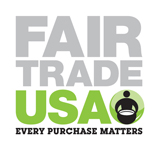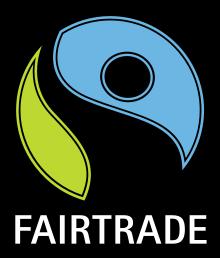
Fair trade is a term for an arrangement designed to help producers in developing countries achieve sustainable and equitable trade relationships. The fair trade movement combines the payment of higher prices to exporters with improved social and environmental standards. The movement focuses in particular on commodities, or products that are typically exported from developing countries to developed countries but is also used in domestic markets, most notably for handicrafts, coffee, cocoa, wine, sugar, fruit, flowers and gold.

Fairtrade International, or Fairtrade Labelling Organizations International E.V. is a product-oriented multistakeholder group aimed at promoting the lives of farmers and workers through trade. Fairtrade's work is guided by a global strategy focused on ensuring that all farmers earn a living income, and agricultural workers earn a living wage. Fairtrade works with farmers and workers of more than 300 commodities. The main products promoted under the Fairtrade label are coffee, cocoa, banana, flowers, tea, and sugar.

The Fair Trade Towns campaign is the result of a grass-roots citizens movement that started in the UK in 2001. It allows citizens to get together in order to self-proclaim their town as a region that complies with a few general Fair Trade criteria, that can be adapted from country to country but which retain their main elements.

The Fairtrade Foundation is a charity based in the United Kingdom that aims to help disadvantaged producers in developing countries by tackling injustice in conventional trade, in particular by promoting and licensing the Fairtrade Mark, a guarantee that products retailed in the UK have been produced in accordance with internationally agreed Fairtrade standards. The foundation is the British member of FLO International, which unites FLO-CERT, 25 National Fairtrade Organisations and 3 Producer Networks across Europe, Asia, Latin America, North America, Africa, Australia and New Zealand.
Fairtrade Fortnight is an annual promotional campaign which happens once every year, organized and funded by the Fairtrade Foundation to increase awareness of Fairtrade products. It makes use of volunteers who support the goals of Fairtrade but who may also be committed to the more general concepts of fair trade, ethical trading or concerned by development issues. The concept was pioneered by the Fairtrade Foundation in the United Kingdom, initially held in 1997 in Scotland and directed by Barnaby Miln.

Maraba coffee is grown in the Maraba area of southern Rwanda. Maraba's coffee plants are the Bourbon variety of the Coffea arabica species and are grown on fertile volcanic soils on high-altitude hills. The fruit is handpicked, mostly during the rainy season between March and May, and brought to a washing station in Maraba, where the coffee beans are extracted and dried. At several stages, the beans are sorted according to quality. The farmers receive credits based on the amount and quality of the beans they provide.

The 'International Fairtrede Certification Mark is an independent certification mark used in over 69 countries. It appears on products as an independent guarantee that a product has been produced according to Fairtrade political standards.

Fair Trade USA, formerly "TransFair USA", is a 501(c)(3) non-profit organization that sets standards, certifies, and labels products that promote sustainable livelihoods for farmers and workers and protect the environment.
Frans van der Hoff, or Francisco VanderHoff Boersma as he is called in Latin America, was a Dutch missionary who, in collaboration with Nico Roozen and ecumenical development agency Solidaridad, launched Max Havelaar, the first Fairtrade label in 1988. Van der Hoff's contacts with Mexican coffee producers were important in securing the supply and ensuring the success of the very first Fairtrade certification initiative.

Fairtrade Canada, formerly TransFair Canada, is a national non-profit certification and public education organization promoting Fairtrade certified products in Canada to improve the livelihood of developing world farmers and workers. It is the Canadian member of FLO International, which unites 24 fair trade producer and certification initiatives across Europe, Asia, Latin America, North America, Africa, Australia and New Zealand.

Fairtrade Nederland formerly known as Max Havelaar StichtingArchived 2022-08-16 at the Wayback Machine is the Dutch member of Fairtrade International, which unites 23 Fairtrade certification producer and labelling initiatives across Europe, Asia, Latin America, North America, Africa, Australia and New Zealand.

Association Max Havelaar France is the French member of FLO International, which unites 23 Fairtrade producer and labelling initiatives across Europe, Asia, Latin America, North America, Africa, Australia and New Zealand.

The Fair Trade Association of Australia and New Zealand is a member-based organization that supports two systems of fair trade. The first is the Australia and New Zealand member of FLO International, which unites Fairtrade producer and labeling initiatives across Europe, Asia, Latin America, North America, Africa, Australia and New Zealand. The second, is the World Fair Trade Organization (WFTO), of over 450 worldwide members, to which the Fair Trade Association is one. Fairtrade refers to FLO certified commodity and associated products. Fair trade encompasses the wider Fair Trade movement, including the Fairtrade commodities and other artisan craft products.
The fair trade movement has undergone several important changes like the operation for ten thousand villages to open their businesses since early days following World War II. Fair trade, first seen as a form of charity advocated by religious organizations, has radically changed in structure, philosophy and approach. The past fifty years have witnessed massive changes in the diversity of fair trade proponents, the products traded and their distribution networks.
The fair trade debate concerns the ethics and economic implications of fair trade, a term for an arrangement designed to help producers in developing countries achieve sustainable and equitable trade relationships. The benefits of fair trade for farmers and workers can vary considerably and the social transformation impacts also vary around the world. However the main concerns from critics is that fair trade may give an unfair advantage to some producers over others.

The Max Havelaar Foundation is a non-profit certification and public education organization promoting Fairtrade products in Switzerland to improve the livelihood of developing world farmers and workers. The Max Havelaar Foundation is the Swiss member of FLO International, which unites 23 Fairtrade producer and labelling initiatives across Europe, Asia, Latin America, North America, Africa, Australia and New Zealand. Several of these corresponding organizations in other European countries also use the Max Havelaar name. The Swiss Max Havelaar organization was founded in 1992 by the Third World aid organisations Brot für alle, Caritas, Fastenopfer, HEKS, Helvetas and Swissaid.

Fair trade coffee is coffee that is certified as having been produced to fair trade standards by fair trade organizations, which create trading partnerships that are based on dialogue, transparency and respect, with the goal of achieving greater equity in international trade. These partnerships contribute to sustainable development by offering better trading conditions to coffee bean farmers. Fair trade organizations support producers and sustainable environmental farming practices and prohibit child labor or forced labor.

A fair trade certification is a product certification within the market-based movement of fair trade. The most widely used fair trade certification is FLO International's, the International Fairtrade Certification Mark, used in Europe, Africa, Asia, Australia and New Zealand. Fair Trade Certified Mark is the North American equivalent of the International Fairtrade Certification Mark. As of January 2011, there were more than 1,000 companies certified by FLO International's certification and a further 1,000 or so certified by other ethical and fairtrade certification schemes around the world.
Sustainability standards and certifications are voluntary guidelines used by producers, manufacturers, traders, retailers, and service providers to demonstrate their commitment to good environmental, social, ethical, and food safety practices. There are over 400 such standards across the world.
Fair trade is where a farmer or craftsperson is paid a fair price for their product, one that represents its true worth, not just the lowest price that it is possible to pay. This is a price that covers the cost of production and enables the producer to live with dignity. Fair Trade New Zealand is an organisation that was launched in 2005 which supports fair trade by ensuring that farmers and workers' rights are not exploited. According to Oxfam New Zealand, there are several companies to support fairly traded goods from, which are exported to New Zealand. From 2013-2014 there were 42 Fair Trade Licensees and Traders in New Zealand. From 2015-2016 this number rose to 54 Fair Trade Licensees and Traders in New Zealand. Gwen Green, Oxfam's Engagement Director, says: "when farmers are paid fairly for their products, we see people able to make real improvements to their lives and their communities. Producers who used to struggle to feed their families are able to give their children an education, and communities can build schools and develop businesses. It is one of the smart solutions to poverty". In 2009, Wellington became the first fair trade capital city in the Southern Hemisphere. In 2017, Whangarei was recognised by the Fair Trade Association of Australia New Zealand as being one of four fair trade councils in New Zealand, and the first fair trade district in New Zealand.










